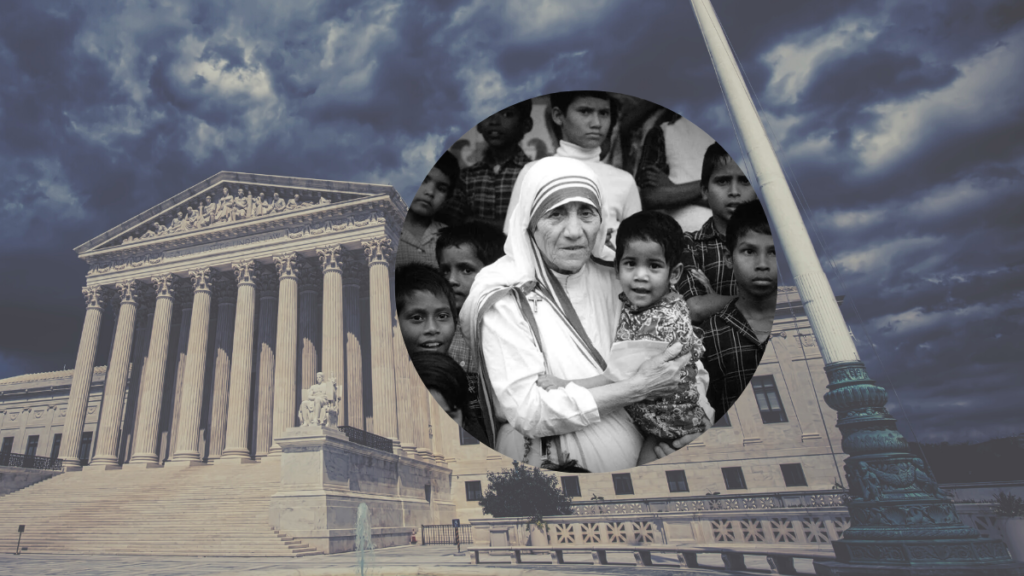If the family truly is “the natural and fundamental group unit of society” (Universal Declaration of Human Rights) and “the sure foundation of all that is stable and noble in our civilization” (Supreme Court, United States v. Bitty), then surely one of the gravest threats to America in the past several decades has been the 1973 Supreme Court decision in Roe v. Wade. Former Vice President Mike Pence recently observed,
Nothing has been more destabilizing in our society for the last 50 years than legalized abortion. I believe it’s no coincidence that the last half century has seen a persistent rise in family instability, single-parent households, a decline in family formation, increase in unplanned pregnancies, and an explosion in sexually transmitted disease [while] unborn children have been relegated into a caste of second-class citizens—devoid of the most basic human rights.
Now, 63 million abortions after Roe was decided, the Supreme Court appears about to denounce it as the tragedy it has been. Writing for the majority in the leaked draft opinion of the Dobbs case, Justice Samuel Alito states, “Roe was egregiously wrong from the start. Its reasoning was exceptionally weak, and the decision has had damaging consequences.”
If the final decision in Dobbs does overrule Roe, it will be the victory long sought by the many brave souls who have raised their voices in defense of the most vulnerable among us. And no voice has been more poignant or powerful than that of the tiny Albanian nun who visited the United States in 1982 and spoke at the Harvard graduation ceremony.
“It is something unbelievable,” she boldly told that ultra-liberal institution, “that today a mother, herself, murders her own child, afraid of having to feed one more child, afraid to educate one more child. This is one of the greatest poverties. A nation, people, family that allows that, that accepts that, they are the poorest of the poor.”
Reporting her speech, the Harvard Journal related that “the ‘angel’ of Calcutta… spoke with almost mesmerizing conviction; her excellent English had an accent and cadence compounded of her native Yugoslavia and India. What she said struck many listeners as anomalous in Harvard Yard on Class Day, but she received a long, standing ovation from the unusually large crowd come to hear a saintly woman.”
Years later Mother Teresa would emphasize that Roe was not just a moral catastrophe but also a tragic betrayal of America’s founding principle. In an amicus brief filed with the Supreme Court in the 1994 cases of Loce v. New Jersey and Krail et al. v. New Jersey, she reiterated the self-evident truths articulated in the Declaration of Independence—“that all men are created equal, that they are endowed by their Creator with certain unalienable Rights, that among these are Life, Liberty and the pursuit of Happiness”—and spoke of America’s continuing obligation flowing from that Declaration.
A nation founded on these principles holds a sacred trust: to stand as an example to the rest of the world, to climb ever higher in its practical realization of the ideals of human dignity, brotherhood, and mutual respect. Your constant efforts in fulfillment of that mission, far more that your size or your wealth or your military might, have made America an inspiration to all mankind…. Yet there has been one infinitely tragic and destructive departure from those American ideals in recent memory. It was this Court’s own decision in Roe v. Wade to exclude the unborn child from the human family…
America needs no words from me to see how your decision in Roe v. Wade has deformed a great nation. The so-called right to abortion has pitted mothers against their children and women against men. It has sown violence and discord at the heart of the most intimate human relationships. It has aggravated the derogation of the father’s role in an increasingly fatherless society. It has portrayed the greatest of gifts—a child—as a competitor, an intrusion, and an inconvenience. It has nominally accorded mothers unfettered domination over the independent lives of their physically dependent sons and daughters. And, in granting this unconscionable power, it has exposed many women to unjust and selfish demands from their husbands or other sexual partners. Human rights are not a privilege conferred by government. They are every human being’s entitlement by virtue of his humanity. The right to life does not depend, and must not be declared to be contingent, on the pleasure of anyone else, not even a parent or a sovereign.
Mother Teresa’s teaching goes to the very heart of our national ethos and the principles that define us, not only in the Declaration but also the Constitution, which is grounded, according to Matthew Spalding, in those “permanent truths about man, politics, and liberty” articulated in the Declaration of Independence—to which the Constitution ties itself. For as Kevin Seamus Hasson points out, the Constitution does not claim to grant the blessings of liberty but rather to secure them, thereby referring back to the Declaration of Independence.
The words of Justice Alito in the Dobbs draft opinion resound as a long-overdue corrective to an infinitely tragic and destructive departure. “[T]he Constitution does not confer a right to abortion. Roe… must be overruled, and the authority to regulate abortion must be returned to the people and their representatives.” If only Mother Teresa were here to rejoice with all who likewise prize and seek to protect “the greatest of gifts—a child.”
